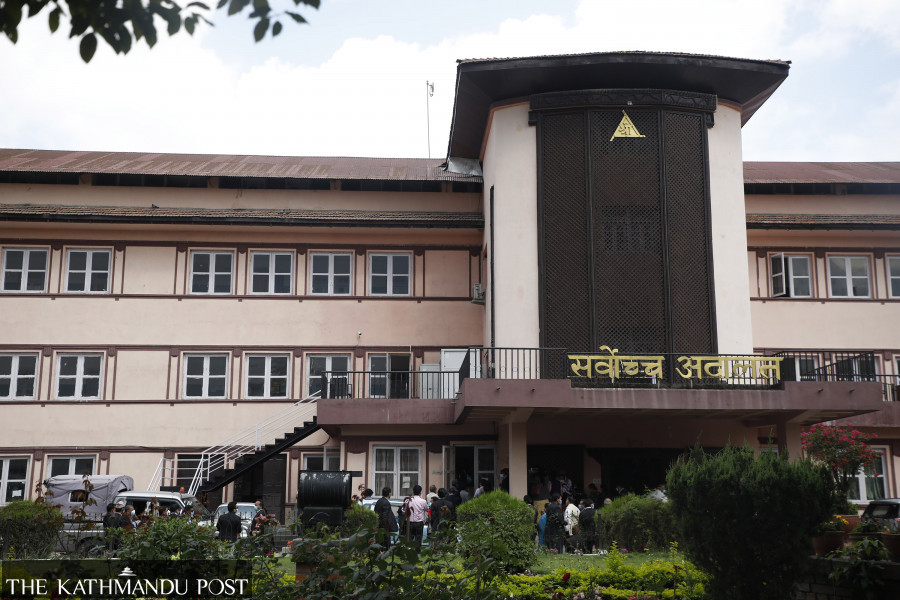National
Justices to decide their further step after meeting chief justice on Tuesday
Monday’s hearings affected after justices were busy in their own meeting to discuss the way forward amid controversies surrounding Rana.
Post Report
Thirteen of the 14 Supreme Court justices, who boycotted the full court meeting called by Chief Justice Cholendra Shumsher Rana on Monday, have decided to take a further decision on Tuesday–after holding a meeting with Rana.
With the justices refusing to extend their support to him and avoiding the benches designated for them, pressure is now mounting on Chief Justice Rana to step down.
“We have decided to take a decision jointly after meeting Chief Justice Rana on Tuesday at 11:30am,” said one of the justices who attended Monday’s meeting of the 13 justices. “We will also listen to his opinion regarding the ongoing controversies.”
The justice, however, said that it would be too early to say that they would ask him “to clear the way”.
On Sunday, 14 Justices had decided to boycott the meeting of the full court scheduled for 1:30pm on Monday. The full court meeting did not take place.
The 14 justices had scheduled a meeting of their own at 11am. Justice Nahakul Subedi, however, was absent, citing his health conditions.
Justices Deepak Kumar Karki, Mira Khadka, Hari Krishna Karki, Bishowambhar Prasad Shrestha, Ananda Mohan Bhattarai, Prakash Man Singh Raut, Bam Kumar Shrestha, Tanka Bahadur Moktan, Prakash Kumar Dhungana, Sushma Lata Mathema, Kumar Regmi, Hari Prasad Phuyal, Manoj Kumar Sharma and Nahakul Subedi were present at Sunday’s meeting.
Five justices Ishwar Khatiwada, Sapana Malla Pradhan, Anil Kumar Sinha, Tej Bahadur KC and Kumar Chudal were absent because they were out of Kathmandu.
Meanwhile, Nepal Bar Association, the umbrella organisation of lawyers across the country, has been holding a meeting of its executive committee.
During the meeting with the Nepal Bar delegation on Sunday, Chief Justice had agreed to allow its representatives to attend the meeting of the full court as observers to decide on the issue of senior advocates. Nepal Bar Association has for long been demanding that the chief justice call a full court meeting and decide on senior advocates.
Since the justices were holding their own meeting, Monday’s hearings were affected. Rana had designated 10 benches for the 13 justices present today.
“Now we won’t be able to hear the cases,” said the justice who spoke on condition of anonymity.
Rana, who took the helm of the judiciary on January 2, 2019, is probably the first chief justice to have run into a series of controversies, with the latest one reported last month when he was said to have sought a share in the Cabinet. Some of his verdicts have also met with criticism. One of them is his June 29 last year’s decision to reduce the sentence of Ranjan Koirala, who was facing a life term for murdering his wife.
Chief Justice Rana agreed to review the decision after a public outcry, but he has not done so.
He is also facing criticism for not conducting a hearing on petitions against constitutional appointments. The erstwhile KP Sharma Oli government had introduced an ordinance to amend the Constitutional Council Act in December last year to ease the convening of the council meetings and making recommendations.
Rana, as chief justice, is a member of the council. Oli had amended the provisions in such a way that a meeting could be called and recommendations made even without the leader of the opposition and the Speaker.
On Sunday, the chief justice’s decision to hold a meeting of the full court in the presence of representatives of Nepal Bar Association had irked the justices and they had decided to boycott it.
Some senior advocates have said it would be good for the chief justice to give a way out at the earliest as there is no other option left for him. But others have said it depends on how the justices take the issue after discussing it with the chief justice on Tuesday.
“The longer he continues, the more the dignity of the judiciary would be affected,” said Dinesh Tripathi, a senior advocate. “Nepal Bar Association has failed in its duty and is rather focused on the issue of senior advocates.”
Chandra Kanta Gyawali, also senior advocate, however, said the justices can decide on a timeline to let the chief justice continue if he commits to making reforms in the judiciary.
“There is no guarantee that the existing problems in the judiciary would be resolved after Rana’s departure,” said Gyawali, who is also an expert on constitutional affairs.”




 18.12°C Kathmandu
18.12°C Kathmandu













